- Home
- John Bellairs
The Hand of the Necromancer Page 6
The Hand of the Necromancer Read online
Page 6
Johnny stammered out his strange story, realizing that it sounded as if the shadow had been part of his bad dream. "It was there. I mean, it was real, not just my imagination. And, Professor, he went down the wall like he had suction cups for hands and feet!"
"You don't say," responded Professor Childermass. "Isn't that odd?"
"What?"
"At the very instant you called and woke me, I was just starting one of my lovely dreams about that creepy-crawly hand. Ugh! I wonder—good heavens, look at the time! You go right back to bed, John, and don't worry about any weird interlopers. I can take care of myself. But thank you for phoning me. You probably saved me from a doozy of a nightmare."
The phone clicked, and Johnny hung up the receiver. He went back to his bedroom with dread in his heart. What if the menacing black shadow had been some sort of spirit or spell instead of a person? And what if it somehow knew he had called the professor? Would it visit his home next, climb down the wall outside his room, softly pry off the screen over his window?
Shivering despite the heat, Johnny huddled in his bed. After a long time he fell asleep again and this time did not dream.
Naturally Johnny felt groggy and cranky the next morning. Gramma had made some delicious oatmeal-raisin bread, and she toasted him a couple of big slices to go with his scrambled egg and bacon. Johnny didn't have much appetite, though, and soon he left to go to the museum.
He rode his bike downtown and along Merrimack Street toward the river. On a Tuesday morning in mid-July, everything was sleepy and slow, but that all changed as Johnny came within sight of the museum. A police car was parked outside the front door. With a creepy feeling of déjà vu, Johnny pedaled faster. He parked his bike and hurried around to the front and up the steps.
He heard Miss Ferrington's wail as he pushed the door open: "It's terrible! Nothing like this has ever happened! And it isn't my fault!"
"Well, gosh, Miss Ferrington, nobody said it was!" It was a young man's voice, but Johnny did not recognize the speaker.
"But just think of what might have happened! The Sophonsoba Peabody pieces are irreplaceable! If they had only known how valuable they were, the museum might have been ruined, desecrated, vandalized!"
What in the world was going on? Johnny paused outside the office door and gave a hesitant knock. For a moment everyone inside was quiet. Then the door opened. Miss Ferrington glared at him for a second or two. Then she turned and said, "Here he is! Johnny Dixon is responsible! And the little hoodlum comes walking in as if he owns the place!"
Johnny backed away, his heart pounding and his throat dry.
A policeman came to stand behind Miss Ferrington. He was young and looked irritable. He carried a clipboard in one hand. "Now, wait," he said. "We don't have any evidence that—"
"He left the door unlocked!" shouted Miss Ferrington. "He's probably the ringleader of a whole band of hooligans! Officer, arrest this boy! Johnny Dixon is the thief!"
For a moment Johnny just stood there with his mouth hanging open, staring at the furious Miss Ferrington and unable even to speak. Then terror raced through him. Without even meaning to do it, he spun and ran. He flew down the steps, raced around the corner, and unlocked his bike. By the time the young policeman was standing in the open doorway of the museum and yelling, "Hey, you!" Johnny was already speeding away. His legs pumped the pedals furiously. He did not know where he was going or what he was planning to do. He only knew that he was in serious trouble, that he was now a fugitive, and that the police were coming after him.
CHAPTER NINE
A terrified Johnny pedaled to the professor's house, turned in at the potholed driveway, and jumped off his bike. He leaped up the porch steps two at a time and pounded on the door. "Professor! Professor! You gotta help me!" yelled Johnny, his voice cracking.
The professor opened the door, a look of astonishment on his red face. He was in baggy gray cotton trousers, an open-collared blue shirt, and his scruffy old navy-blue terrycloth slippers. "What on earth is wrong, John?" he asked, his eyes round with wonder.
"M-Miss F-Ferrington th-thinks I stole something!" stammered Johnny, tears in his eyes. "Sh-she has the p-police after me, but I didn't, Professor. I swear to God I didn't!"
"Calm down," said the professor in a kindly voice. "I can hardly understand what you're saying. Miss Ferrington thinks you stole something?" When Johnny nodded miserably, the professor looked angry. "Why, that's preposterous! What are you supposed to have pilfered from that museum, better described as Junkpile Manor?"
"I don't know," confessed Johnny. "D-do you th-think they'll send me to jail?" He imagined jail as a dark brick closet, with rats and spiders creeping around in the smelly dankness.
"Certainly not!" exploded the professor. "Give me a minute to get into some more suitable clothes, and then let's march right over to your house, John Michael. When trouble comes, I always believe you should face right up to it. And don't worry. You have plenty of good friends, and we know you'd never steal so much as a paper clip from the Gudge Museum."
The professor made Johnny come inside and sit in the new armchair in the living room while he went upstairs for his shoes, tie, and jacket. Johnny began to weep. Not because he was so frightened, but because he had seen tears glistening in the professor's eyes too. He knew that what Professor Childermass said was true. Gramma and Grampa would just about give up their lives for Johnny, and so would the professor and Fergie. The thought of having friends like that overwhelmed Johnny, and he cried partly out of a reaction to his fear and uncertainty, but mostly out of relief.
A more presentably dressed professor came downstairs, nodded grimly, and said, "Let's go." The two of them hurried across Fillmore Street, where the professor summoned Johnny's grandmother and grandfather to what he called a council of war. They sat at the oak table in the kitchen and a hesitant Johnny did his best to explain what had happened. The professor could not sit still, but paced, humming unmusically, as he often did when angry or worried. When Johnny's explanation trailed off, everyone was quiet. The red electric clock made a buzzing sound that seemed loud in the silence.
"I can get to the bottom of this," announced the professor, and he went to make a telephone call. After a few minutes he returned, rubbing his hands. "Everyone can relax. The police are not after Johnny, despite what he heard Miss Ferrington say. They don't believe Johnny was in on the heist."
Grampa raised his eyebrows and scratched his bald head. He frowned and asked, "In on th' what, Rod?"
The professor looked impatient. "The heist. You know, the caper." He read a lot of mystery stories, and he thought that policemen and criminals talked like that. When he saw that Grampa still didn't have a glimmer of what he meant, the professor puffed out his cheeks, rolled his eyes, and in an exasperated voice said, "The burglary, to put it in plain English."
Gramma, a short, white-haired woman, put her hand against her chest. "Mercy sakes! Somebody robbed the Gudge Museum? What did they steal, Professor?"
"According to the police," the professor said, "the criminal had a strangely discriminating taste. The burglar lifted only items from the Colonial Curiosities Room, and at that, he took only the ones that I had lent to the museum. So the yegg, or as you would probably call him, the thief, got away with a boxful of crummy junk that he could probably fence for, oh, maybe eleven dollars and seventeen cents."
A shock ran through Johnny. "Professor!" he exclaimed. "That means—"
The professor gave him a warning look. "That means that the burglar was dumb enough to think that those stupid old geegaws were actually worth good American money," he said firmly. "But we know he was mistaken."
Johnny realized that the professor did not want him to mention Mr. Mergal in front of Gramma and Grampa. He swallowed his words and nodded.
"Well, Rod," asked Grampa, "why did th' woman think Johnny took her old rubbish, anyway?"
Professor Childermass made a face. "From what the police say, it's because he worked lat
e yesterday and was the last one to leave. Johnny was supposed to lock up the museum before he went home."
"I did!" said Johnny. "I remember trying to pull the front door open, an' it was locked tight!"
"How about the back door?" asked the professor.
Johnny frowned. "The loading-dock door? Well, that one has to be opened with a key all the time. I mean, if you open it with a key and then close it, it locks automatically."
"Are you sure you pushed the door all th' way shut?" asked Gramma, looking worried. "Mightn't you have made a mistake, Johnny?"
Johnny shook his head. "I know it was locked when I left. That door has a whatchamacallit, a closer on it, that pulls it shut. I heard it click, I know I did."
"I believe Johnny," said Grampa, laying a big hand on his grandson's shoulder.
"Of course you do," returned the professor. "So do I. My heavens, if they need a character witness, Father Higgins will be glad to testify to Johnny's honesty. You can't get a much better reference than a priest!"
"Still, even honest people can make mistakes," said Gramma.
"Be that as it may," returned the professor calmly, "Miss Ferrington swears that the back door was ajar this morning. It was propped open, and also someone had jammed the lock, so it couldn't close properly."
"I didn't do it!" Johnny insisted.
The professor patted him on the shoulder. "Of course you didn't. Now, don't worry. You see, I own all the things that are missing from the museum. Even if you left the front door open with a sign on it saying, 'Hey, crooks, come in and help yourselves,' I would have to file a complaint for the police to bother you. And I have no intention of complaining about losing that miserable heap of trash. My frivolous brother Perry had no right to saddle me with all that ghastly garbage, anyway. Good riddance is what I say."
But Gramma and Grampa were still troubled, so the professor said he would take Johnny down to the police station and "put the fix in." They walked downtown, and on the way Professor Childermass warned Johnny, "I'm sorry I stepped in so abruptly back there, but our charming Mr. Mergal is no one your grandparents should be worrying about. Let me deal with him, and everything will be all right."
"Do you think he did it, Professor?" asked Johnny in a small voice. He hated this walk to the police station, and he still had a lingering fear that they might throw him in a cell and give him the third degree.
"Do I think Mr. Mergal stole the Blackleach exhibits?" mused the professor. "Well, let me put it this way: a big, fat yes! And do I think our police force will pin the crime on him? Not in a million, billion, gazillion years. No doubt our clever, felonious friend has set up some cozy little alibi, just as he did after ransacking my house. Probably he will claim to have been in Bombay admiring a white elephant, or in Katmandu chatting with a lama, or maybe in Marie Byrd Land hobnobbing with some emperor penguins."
"What does he want with all that stuff?" asked Johnny.
The professor sighed. "Lord knows. Dr. Coote has worked hard gathering together all the old manuscript books on the evil wizard Blackleach, but I haven't read through them yet. I will owe Charley a delicious dinner at some first-class restaurant when this is all over. He's taking time out from correcting the proofs of his voodoo book to research these things for me."
They went into the police station, and in a small room a young plainclothes police officer came in to talk to them. He had sandy brown hair, a long nose, and eyebrows that were so high they made him look a little astonished all the time. He introduced himself as Sergeant Mike Kluczykowski and listened politely to Johnny's story. Then Sergeant Kluczykowski pulled his nose thoughtfully, as if it were not yet quite long enough to suit him. "Hmm. I see. Well, Miss Ferrington reported that she came in this morning to unlock and she felt a breeze. She went down the hallway and into that little alcove, and there she found the back door open. It was propped with a brick. She tried to close it—that was a silly thing to do, because we want civilians to leave a crime scene alone—and the lock wouldn't click. Someone had jammed a small piece of gravel in the latch plate. She went through the whole museum and discovered that the exhibits in the Curiosities Room were missing, and then she called us in." He gave Johnny a rueful smile. "I don't really think you are to blame, but I'm afraid Miss Ferrington is pretty mad. You've probably lost your job." The sergeant turned to the professor. "Now, since you own those antiques, I guess it's up to you to give us a description of them."
"There's really no need of that. I don't want to press charges," the professor told him.
The young policeman tugged at his nose once again.
"Well, that's a little awkward, because you see, breaking and entering is a crime. In fact, it is a felony, which means we can't drop our investigation, whether you want your stuff back or not. So I'll have to insist that you give us a description of the missing items."
Professor Childermass grumbled a bit, but he finally agreed. A black-haired young woman carrying a stenographer's pad came in and took down the information. At last Sergeant Kluczykowski thanked them for their help and told them they could go. The two friends walked back to Fillmore Street together. The professor was in a bad mood and he was smoking one of his Balkan Sobranies as they strode along. Johnny didn't have the courage to remind him that he was trying to quit. Now that Johnny knew the police didn't intend to put him in solitary confinement, he felt better. Still, he sensed that he was in for more trouble.
When they turned onto Fillmore Street, Johnny saw Sarah Channing sitting on his front porch steps. "Oh, no," he groaned. "Now I'll have to tell her the whole story. Professor, what do you think I ought to do about my job?"
Professor Childermass shook his head hopelessly. "Well, John, I'm afraid the policeman was right. Miss Ferrington isn't one to forgive and forget, so she probably will fire you. I'll call her if you wish. Unfortunately, with brother Perry's marvelous magical mementos now missing, I have nothing to bargain with. However, when we pin this job on dear Mr. Mergal, I'll do everything I can to get you back into whatever good graces the lady has."
"Hey, Dixon!" shouted Sarah as they approached. "I heard about the burglary on the radio, so I went right over to the museum." She came jogging up. In a quieter voice she said, "Only Miss Ferrington told me you don't work there anymore. Is that true?"
"Yeah," said Johnny miserably. "Yeah, I guess it's true." It had been a long time since he had felt this heartbroken. He had let everyone down: Miss Ferrington, of course, but even worse, Professor Childermass, Gramma, and Grampa too. He could only hope that the professor was right and that somehow he could clear his good name and find the real thief.
But at the moment that seemed like a forlorn hope.
CHAPTER TEN
The big showdown came two days later, when Sarah finally persuaded Johnny to confide his worries to her. Johnny had received his last pay envelope in the mail. It wasn't very much money, but it reminded him of the job he had lost, and thinking about Miss Ferrington's accusations depressed him. When Sarah telephoned to chat, Johnny admitted he was unhappy.
Sarah listened with sympathy and then suggested that he teach her how to play chess, something they had talked about before. Maybe it would take Johnny's mind off his troubles for a little while. He didn't really think it would, but then it might be sort of cheerful to play again. He and Fergie always played hard-fought, interesting games of chess, and the professor was usually a good opponent. But with Fergie away and the professor preoccupied, Johnny hadn't touched his chessboard in weeks.
He met Sarah at the public library, and they set up Johnny's chessboard in the Conversation Room on the first floor. Quiet talking was allowed there, and lots of people met there to play chess or checkers. Sometimes spectators even collected in small audiences to watch games and debate each move in whispers. Johnny was glad to see no one was there, because he felt self- conscious about playing chess in front of people. He arranged the pieces on the board. Sarah watched as Johnny explained how each chess piece could move, and t
hen she moved them herself, making sure she understood.
Next Johnny explained what a gambit was—a series of beginning chess moves that could be developed into an attack or a defense. There were lots of standard openings, but they would begin with very simple ones. Then he hid a couple of pawns in his hands, and she chose the hand that held the white one. "Okay," he said. "White always moves first. Now, the first time you move a pawn, it can go either one or two squares. I'd start with the one in front of the queen or the king."
And then as they moved the chessmen, Sarah started in again, asking about Mattheus Mergal and what he had to do with the storm in the park. "I didn't see him, but he really gave you the creeps, didn't he?" she asked.
Trying not to show either annoyance or anxiety, Johnny kept his gaze on the board. "Yeah, I guess he did. He's a peculiar guy."
Sarah stared over the chess pieces, frowning at him. "Weird how? Does he run through the streets in his underwear, playing a banjo and singing 'Hail, Columbia'? Does he turn into a werewolf when the wolfsbane blooms, and the moon is shining bright?"
"Let's just play chess, okay?" Johnny did not feel like talking about Mattheus Mergal. For one thing, he was a mystery, and Johnny did not know all that much. Then too, Johnny had a bad feeling that no matter what he said, Sarah would misunderstand.
But Sarah would not let the matter drop. As they moved their chess pieces, she kept asking questions, and she refused to let Johnny get away with shrugging them off. Little by little she wore down Johnny's reluctance.
Finally Johnny sighed and dropped his voice to a whisper, "Okay, okay, but you'll never believe me." He took a deep breath. "It all goes back to the witch things." He told her about Esdrias Blackleach. Then he said, "I think Mr. Mergal wants to get all of Blackleach's magical stuff so he can cast spells too. He must have been the one who broke into the professor's house and later stole all the Blackleach pieces from the museum. He got me fired, and I think he tried to kill the professor with that magic lightning in the park."

 The Curse of the Blue Figurine
The Curse of the Blue Figurine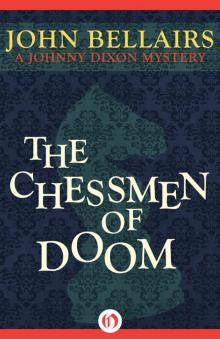 Chessmen of Doom
Chessmen of Doom Secret of the Underground Room
Secret of the Underground Room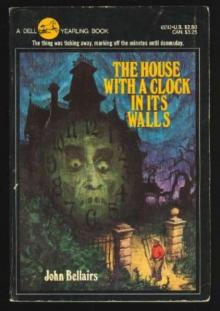 The House With a Clock in Its Walls
The House With a Clock in Its Walls The Vengeance of the Witch-Finder
The Vengeance of the Witch-Finder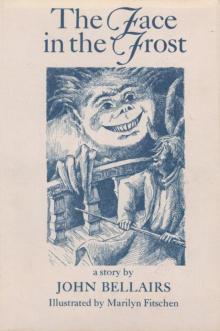 The Face in the Frost
The Face in the Frost Revenge of the Wizard's Ghost
Revenge of the Wizard's Ghost Spell of the Sorcerer's Skull
Spell of the Sorcerer's Skull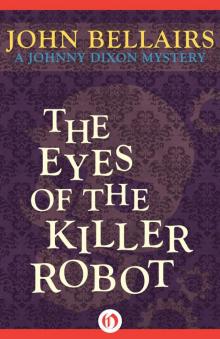 Eyes of the Killer Robot
Eyes of the Killer Robot Mummy, the Will, and the Crypt
Mummy, the Will, and the Crypt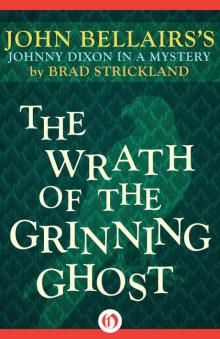 Wrath of the Grinning Ghost
Wrath of the Grinning Ghost The Mansion in the Mist
The Mansion in the Mist The Doom of the Haunted Opera
The Doom of the Haunted Opera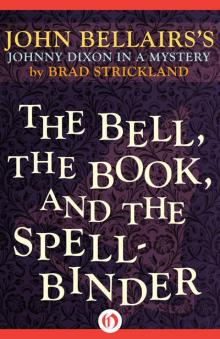 The Bell, the Book, and the Spellbinder
The Bell, the Book, and the Spellbinder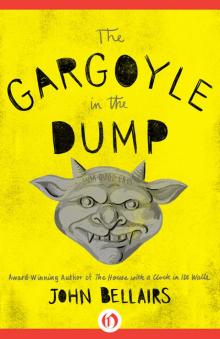 The Gargoyle in the Dump
The Gargoyle in the Dump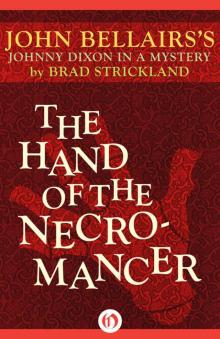 The Hand of the Necromancer
The Hand of the Necromancer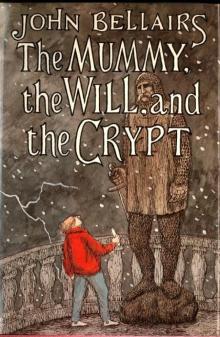 The Mummy, the Will, and the Crypt
The Mummy, the Will, and the Crypt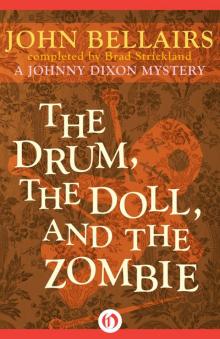 Drum, the Doll, and the Zombie
Drum, the Doll, and the Zombie The Specter from the Magician's Museum
The Specter from the Magician's Museum The Letter, the Witch, and the Ring
The Letter, the Witch, and the Ring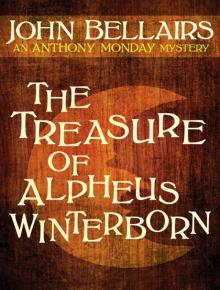 The Treasure of Alpheus Winterborn
The Treasure of Alpheus Winterborn The Dark Secret of Weatherend
The Dark Secret of Weatherend The Figure in the Shadows
The Figure in the Shadows